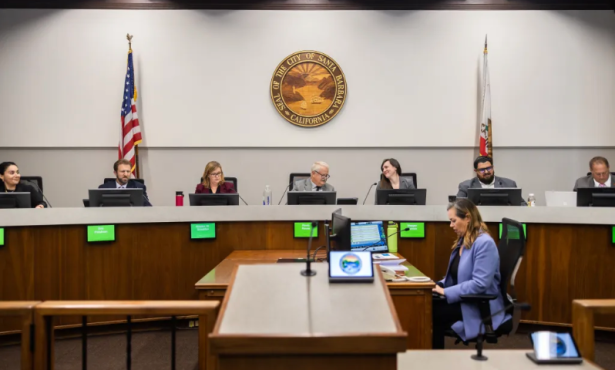Never Again, Never Again, Never Again!
The Voices from Darfur Campaign Visits UCSB
“Never Again, never again, never again!” said Elie Wiesel at the “Rally to stop Genocide” in Washington, D.C. in April, 2006. Wiesel explained that in the 20th Century, we didn’t stop the genocides in Europe, Cambodia, Bosnia, and Rwanda, but we still have a chance to stop the first genocide of the 21st Century. Organized by Save Darfur, the rally was one of their first major public outreach efforts. Now in its fourth year, Save Darfur has dedicated itself to bringing to the world’s attention the atrocities that are still being committed by the predominantly Arab Sudanese government and their mercenaries against the black African Sudanese in the Darfur region. Voices from Darfur is a campaign they are currently running that brings people from that region around the world to tell of their terrible experiences in the Darfur genocide.
Located directly south of Egypt, Sudan is Africa’s largest country. Darfur is a region roughly the size of Texas, occupying the western portion of Sudan, and is home to the majority of “Islamic black Africans” in the country. Darfur contains approximately six million people-among the poorest on the entire continent of Africa-who exist mostly by subsistence farming and nomadic herding. Life is hard on the dry plains of the Darfur region, and its inhabitants have never received much support from the government in Sudan’s capital city of Khartoum.
In 2003, due to years of neglect, drought, and other hardships, insurgents in Darfur lashed out against the Sudanese government, incurring a brutal reprisal. President al-Bashir sent in Sudanese Army troops-aided by bands of Arab mercenaries known as the Janjaweed-to Darfur to systematically destroy villages of black Africans. Still in use, the Janjaweed are given promise of land ownership, money, and given carte blanche to loot, rape and kill. This they practice with chilling enthusiasm. Rape is used as a tool of war there, and often, children are subject to it as well. People are routinely burned alive. Currently, 400,000 people have been killed by these bloody campaigns, and 2.5 million have been displaced.
“We have a saying in my town: The woman has no enemy,” said Niemat Hmadi, a speaker for Voices from Darfur at a presentation at the University of California, Santa Barbara today. “Before, a woman was respected at all times. She could go walking at night. This is no longer the case. The woman went from being the most secure person in our society to being the most vulnerable.” She continued, telling the group of approximately 100 students assembled in the lecture hall at UCSB’s Multicultural Center about how, due to her efforts to bring awareness to the brutality, she was threatened and attacked by Janjaweed mercenaries. One day, a masked Janjaweed man attempted to strangle her with her own scarf. When she reached up and pulled his mask off, he ran away, apparently afraid of having his identity discovered. Another day, a small car with seven passengers inside was shot to pieces because the Army thought that she was inside. All of the occupants were killed.
Despite her family’s pleas otherwise, Hmadi moved to Khartoum to continue her education and plead the case of Darfur’s people to the government. She attained her master’s degree, but it was too dangerous to try to get information about the genocidal activity out of Sudan. “No journalist could write about Darfur, or the publication would be shut down for one year and the journalist arrested,” she said. “I have friends who are journalists who have been in jail for two years.”
Hmadi’s work to get the story of her people relayed to the rest of the world got her in touch with Save Darfur and Bill Wasserman. Wasserman, a UCSB grad, is a campaign consultant for a public affairs firm in D.C.-M + R Strategic Services-specializing in grassroots campaign organizing. Starting with an internship-creating a referendum ballot initiative to save a quirky bookstore in Santa Barbara-with Professor Dick Flacks, Wasserman worked his way into a life spent as a professional activist. His firm works on an array of issues, from anti tobacco to human rights campaigns. “If they need political muscle, people call me,” he said. He has been working on the Darfur campaign for three years now.
Wasserman said that the deployment of UN forces is absolutely necessary to stop the violence in Darfur, but that the government of Sudan will accept only African UN troops. At this time, there aren’t enough trained African troops available. He continued that in order to be successful, three things need to be done: First, China-which is heavily involved in oil development in the region-should engage in the issue; Second, economic pressure should be put on the Sudanese government by pulling out the dollars of American businesses; Third, there should be a full deployment of UN forces in Darfur. “We should also support the investigations of the UN International Criminal Court (ICC) to get the perpetrators,” he said. “The year I came to UCSB-in 1977-a man named Pol Pot initiated the worst genocide since the Holocaust. We didn’t stop that genocide, but we can stop this one.”
The Voices from Darfur campaign is scheduled make stops all over the country. Hmadi will speak at many of them, but her next stop is in New York City, at the UN Commission on the Status of Women, on behalf of Femmes African Solidarity-an organization representing women at the national and international level. The campaign’s visit to UCSB was made possible by the efforts of Global Studies Professor Richard Appelbaum, the Student Anti Genocide Coalition (STAND), and Students for Chad Refugees.
The event organizers encouraged everyone to get involved if they can. For more information, visit Save Darfur’s website at www.savedarfur.org.



